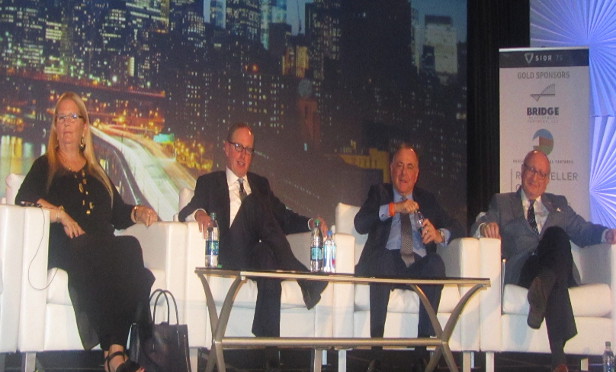 Left to right: Darcy Stacom, Mitchell Steir, Stephen Siegel and Bruce Mosler. Photo credit: Rayna Katz
Left to right: Darcy Stacom, Mitchell Steir, Stephen Siegel and Bruce Mosler. Photo credit: Rayna Katz
NEW YORK CITY—Achieving the status of ‘super broker’—a designation sometimes conferred on real estate professionals who’ve risen to great heights—is no small task.
Earning the title requires strong listening skills, ambition and, above all else, hard work, a group of such individuals said late last week during a panel discussion at SIOR’s annual national convention here.
“The stars in any business are the ones with the most talent who work the hardest,” declared Stephen Siegel, chairman-global brokerage, CBRE. “The combination has to be there.”
That hard work has to include a great deal of research, he continued. “You should go into a meeting armed with as much information—or more—as the person you’re meeting with possesses.”
Added Mitchell Steir, CEO, Savills Studley, “The more homework you do on the front end, the less you do on the back end when you’re closing. You have to be 100% prepared in even in the first casual meeting [with a client.] If I’m not, I postpone it.”
In other words, brokers need to go beyond standard operating procedure to succeed, asserted Darcy Stacom, vice chairman and head of investment properties group, CBRE, speaking not just of her own record but of some members of her team. “Super brokers listen harder, follow the systems in place but they add to that and innovate. They don’t take ‘ok’ for an answer.”
Another ingredient that fosters success is mentorship, shared Bruce Mosler, chairman-global brokerage, Cushman & Wakefield. “Great mentorship is how you catapult yourself forward. When you can get [a good mentor’s] time and pick their brain, it moves the needle.”
Commitment to the work is another key, he continued. “You have to be totally dedicated to your craft and thinking about it most of the time.”
The other panelists agreed, noting personal sacrifices they made in their early work life to reach their current level. “For the first 10 to 15 years of my career, I never took a personal call,” admitted Steir. “When you’re on commission, there’s always insecurity.”
Shared Stacom, “I didn’t entertain outside of the office, and I’ve never lived more than 20 blocks away from the office.”
It may sound like a tough juggling act, but it’s a mandatory one, Mosler stated. “Your time management is the most important ingredient in whether you succeed or fail.”
Still, even the best brokers will make mistakes sometimes, the panel agreed. What’s the best approach to picking up the pieces? Honesty. “When you make a mistake, acknowledge it, and if you’re working with a client, acknowledge it right away so you can move on,” added Mosler.
Brokers also need drive—or some might say hunger—in order to thrive. “There’s always been that drive in me to get that listing or to ask, ‘What’s next?’,” said Stacom. “In any market, you can be 1000% convinced that an assignment is yours but the person who thinks it’s theirs won’t do a good job with the pitch.”
She advised brokers to take clients by surprise. “If you go in and do what they’re not expecting, there’s a good chance you’re getting that listing.”

















 Copyright © 2024 ALM Global, LLC. All Rights Reserved.
Copyright © 2024 ALM Global, LLC. All Rights Reserved.